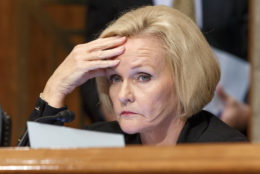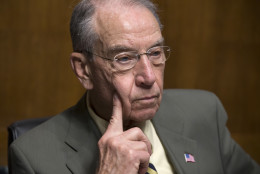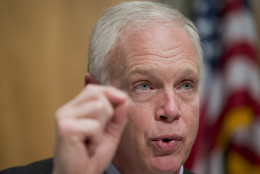Ron Johnson
-
The Food and Drug Administration — and in particular its ability to collect crucial fees — is at stake in a new legislative proposal.
August 15, 2017 -
The president's 2018 budget proposal includes cuts to the Transportation Security Administration and grant programs for local law enforcement. But some senators say the funding increases at other parts of the Homeland Security Department come at the expense of valuable tools to respond to threats at United States ports of entry and smaller scale and local incidents.
June 06, 2017 -
The Merit Systems Protection Board is moving forward with a whistleblower case from James Wilson, the chief human capital officer for the Office of Special Counsel, who filed a whistleblower retaliation complaint against OSC. The agency plays a key role in investigating cases of whistleblower reprisal and protecting federal employees from prohibited personnel actions.
May 30, 2017 -
So clearly there is risk in eliminating the polygraph for new hire. A risk management approach asks, is it a risk worth taking?
May 19, 2017 -
Amid reports that the White House is planning budget cuts at the Coast Guard, Transportation Security Administration and Federal Emergency Management Agency to pay for the President's border security and immigration policies, some senators are worried the Homeland Security Department will forget the lessons it's learned about risk-based management. They asked Elaine Duke, the nominee to be the DHS deputy secretary, about her approach to future budgetary decisions.
March 08, 2017 -
Rep. Mick Mulvaney (R-S.C.) offered his first insights into his management ideas during his two-committee marathon nomination hearings to be the next director of the Office of Management and Budget.
January 25, 2017 -
Gen. John Kelly, the President-elect's pick to be the Homeland Security Department's new secretary, said he recognizes DHS' immense challenges and plans to study up on the previous administration's attempts at management reform.
January 11, 2017 -
Current Homeland Security Department Secretary Jeh Johnson's vision of "unity" will carry into the new administration, as Congress officially codified several of his priorities in the 2017 National Defense Authorization Act. DHS will have a new strategic planning and policy office, as well as several joint task forces to coordinate activity across the department's 22 components.
December 27, 2016 -
Senate Homeland Security and Governmental Affairs Chairman Ron Johnson (R-Wis.) and Senate Judiciary Chairman Chuck Grassley (R-Iowa) outlined their concerns with the Veterans Affairs Department in a letter to Vice President-elect Mike Pence. Meanwhile, current VA Secretary Bob McDonald said Congress has been the biggest barrier to true transformation at the VA.
December 20, 2016 -
A provision in the 2017 National Defense Authorization creates new categories of administrative leave: "investigative" or "notice" leave. Employees under an adverse personnel action investigation may stay on leave for 10 work days.
December 08, 2016 -
House Oversight and Government Reform Committee Ranking Member Elijah Cummings (D-Md.) and Sen. Elizabeth Warren (D-Mass.) asked the Government Accountability Office to review potential conflicts of interest, possible violations of security protocol and issues of transparency and logistics of President-elect Donald Trump's transition. Meanwhile, two other lawmakers are once again raising concerns about the potential for political appointees to "burrow in" to career positions.
November 23, 2016 -
In today's Top Federal Headlines, the Homeland Security Department's inspector General points out many glaring problems with the agency's process in distributing Green Cards.
November 23, 2016 -
Experts in the federal community say President-elect Donald Trump's business acumen will likely factor into the future of the federal workforce during the next administration. Trump will likely play closer attention to measures that would hold poor-performers accountable. Though they may not agree on all the issues, some federal unions say they hope they can find common ground on proposals that would advance federal hiring reforms.
November 09, 2016 -
The Senate gave the federal watchdogs a shot in the arm this week with the release of a new report that confirmed some long-held concerns within the inspectors general community.
October 21, 2016 -
Industry can no longer protest civilian agency task and delivery orders worth more than $10 million to the GAO after the Senate didn’t pass a bill that would’ve extended the authority permanently.
October 11, 2016














